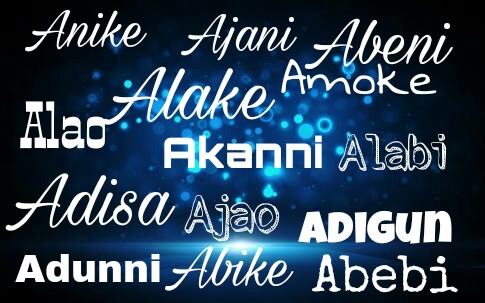Although I'm Urhobo by my father's imprint, I've lived most of my life as a Yoruba girl. Having only lived outside the South-West of Nigeria for about 4 years cumulatively. My first name is Yoruba and naturally I married a Yoruba angel...
So when I say I'm fascinated by Yoruba names, you know where I'm coming from. Right from when I was a teenager, I'd been picking out baby names for my unborn children.
My love for Yoruba names originated from my Oriki; Adunni. My maternal Grandmother, Maami, christened me Adunni which literally means "The one who is sweet to have" in other words, "Cherished" or "a delight". Maami rarely ever called me by any other name. The sound of Adunni from her mouth made me feel special and cherished. Just as she did have a pet name for me, she had one for all my siblings and cousins alike. Everyone in my maternal family had an oriki and till date we still answer to them with pride.
We had a whole lot of Orikis flying around while we were kids. There's Apeke (F. called to be pampered), Arike (F. To see her is to pamper/care for her), Alani (M. The first to have ; usually named to first sons), Akanji (M. Specially chosen/born), Amoke (F. To know her is to pamper/spoil her), Akanni (M. This one is more than enough), Abeni (F. We begged to have her), Abeke (F. We asked for her so we can pamper her) and so many others.
Yoruba Orikis are beautiful names with powerful meanings though they are rarely used as first names. There's this erroneous perception that orikis are 'local' and somewhat antiquated hence relegated to be used strictly as a pet name in the home. However, I am of the opinion that these names are too aesthetic and rich to not be properly utilised as first names
I named my daughter Amoke after my mother. I had fallen in love with the name and the woman who bore it so gracefully. Amoke means to know her is to cherish and pamper her. I use the name as a mark of endearment so much so that whenever I call the not so little one by the name, she knows I'm either going to give her a talk or simply hug her.
Same way my mum would call me on the phone and greet with "booni Adunni" (how are you Adunni). Or how she knows that she can ask to do anything for her just by teasingly referring to me as 'Adunni Mi'. It works, most times.
Every Yoruba family should have an Oriki culture. Orikis are an everyday way of showing affection and letting your kids know that they are special to you, loved and appreciated.
If you are not sure which to use, I will in another post attempt to list all known orikis and translate them as best as I can.
Yours,
Adunni

No comments:
Post a Comment
Hey there, thanks for stopping by!